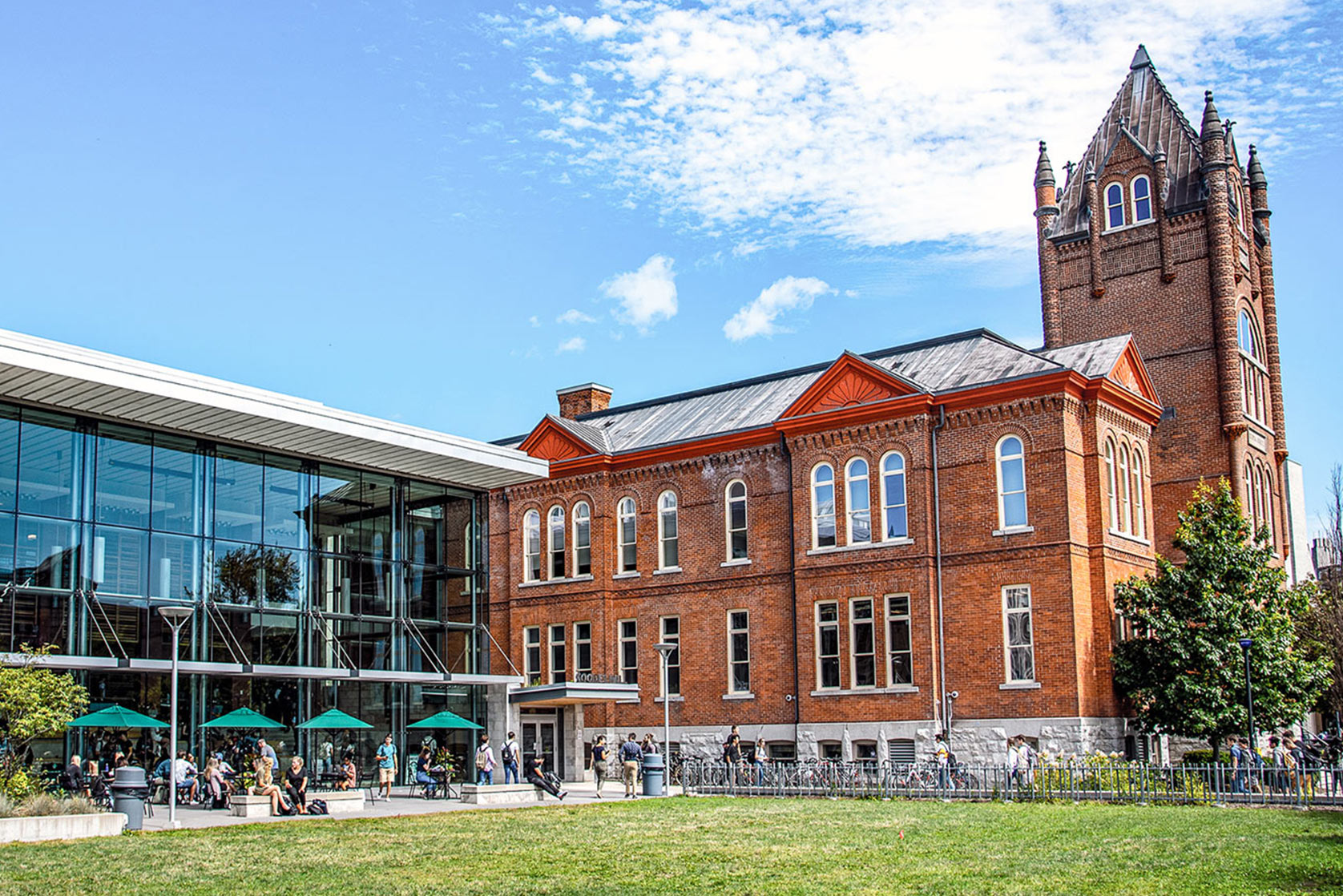A focus on EDII
Access, equity and inclusion are an important part of Smith’s future and the key to developing the next generation of business leaders and global citizens.
Diverse workplaces are more innovative and produce better results. Research has time and time again proven that true. It’s not just corporate offices that benefit from a strong culture of equity, diversity, inclusion and indigenization (EDII). Universities and business schools do too—and they must become leaders in the field.
That’s one reason that last spring Smith School of Business unveiled a new EDII Strategy and Action Plan, which was developed with the input of school alumni, students, staff and faculty. The strategy recognizes that access, equity and inclusion are vital to our school’s future and to developing graduates with the broad knowledge, skills and perspectives needed to contribute meaningfully to society as well as advancements in business.
Smith’s new dean, Wanda Costen, says that EDII is an important part of Smith’s ability to make a positive difference in Canada and the world. As she told Smith Magazine last summer: “I look at success in terms of the impact that we can have as an organization. The university’s focus on the United Nations’ Sustainable Development Goals really sends the message about how everything we’re doing on this campus is going to be geared towards impact—globally, but also in our own local communities . . . If we ask ourselves what the role of business education is in a global society, I’m hoping that we’re developing the kinds of leaders that recognize business for good.”
Support for students
Creating impact and implementing Smith’s EDII strategy takes time, of course. Over this past year, we’ve taken positive steps toward that future. A good start has been to provide more opportunities for diverse candidates to get a Smith education. To help achieve that goal, several admission awards were created during our 2021-2022 fiscal year. These include:
Three new undergraduate awards to improve access to business education for under-represented communities: The Wright Family Award, established by Susan and Jay Wright, BCom’81, looks to increase the representation of Indigenous business leaders in corporate Canada; the Commerce Oportunidad Award is aimed at Latin American students; and the Darren N. Costen Award (established by Dean Costen and named in honour of her son) aims to address the under-representation of Black students in the Commerce program and to alleviate the economic strain faced by students who are the first people in their families to attend university.
Two new awards for Black and Indigenous students: the Smith School of Business Scholarship for Black Students and Smith School of Business Scholarship for Indigenous Students. These are awarded annually across 13 Smith programs.
Supporting students goes beyond admission awards, however. For example, two Commerce student clubs—the Smith Black Business Association and Q+—have launched mentorship programs with help from alumni. A new EDII club was also formed. The EDII Club for Smith professional master’s students hopes to increase awareness about EDII challenges and present educational opportunities for professional graduate students.
Another initiative to help students comes from the school’s Centre for International Management (CIM). CIM worked with colleagues across Queen’s, student interns, student clubs and other universities to launch “Diversity Abroad.” The program provides resources to Smith students going on international exchange. Areas of focus include 2SLGBTQ+, faith communities, Indigenous students, mental health, racialized students and students with disabilities. The goal is to ensure outgoing exchange students are well-prepared for and feel supported while on exchange.

Leaders in diversity
It’s nearly impossible for an organization to bring about meaningful change without having people in positions to make it happen. At Smith, several new people and jobs are helping to foster EDII within the school and beyond.
One of those is the dean: Wanda Costen brings her own lived experiences to Smith and was among the first generation of women to attend West Point. Costen’s research expertise covers women and leadership, strategic human resources, racial and gender inequality in organizations, managing diversity, and ethnic minority student experiences. She has also consulted on EDII issues in the public and private sectors with corporations and government.
Smith has also created a new staff position: director of equity, diversity and inclusion. This new role has responsibility for the implementation and progress of the school’s EDII Strategy and Action Plan—working closely with the dean, school administrators, and academic and student leaders to advance EDII in the teaching, learning and work environments and will serve as an expert resource on EDII-related matters.
Finally, last summer, a new faculty member was brought aboard with specialized research expertise in diversity and inclusion: Ed Ng is the Smith Professor of Equity & Inclusion in Business and his research focuses on managing diversity for organizational competitiveness, the future of work and managing across generations. Ng’s work offers useful lessons for business leaders and in January a webinar on Smith Business Insight that he led—“Diversity at Work: How Leaders Can Drive Change”—drew an audience of more than 400 business people from across Canada.
Career development
Developing future leaders starts in school, and continues as students begin their careers. Through Smith’s Career Advancement Centre (CAC), the school is providing a number of opportunities for diverse students in the workplace.
In April 2022, for example, the Equity, Diversity, Inclusion, and Indigenization Internship (EDI3) program was launched. It’s aimed at first, second and third-year Commerce students from equity-deserving groups who are seeking a summer work experience. Fifty-seven students signed up to secure a summer internship. They will be paired with dedicated mentors who can offer career advice and guidance through monthly meetings.
For the second year, the CAC also hosted a Diversity Clubs fair to connect Smith’s corporate partners with student diversity groups. The goal of the fair is to give student clubs exposure and support for their initiatives and events with corporate partners. At the same time, the fair allows companies to get involved with the student groups and identify talent. To help corporations further, the CAC has created a best practices guide for employers on attracting and engaging with students from diverse and under-represented groups.
In 2021, the CAC launched a career preparation program for international students to help them navigate the unique challenges of job acquisition in the Canadian market. The eight-session program focuses on the tactical requirements needed to achieve career success in a safe and inclusive environment and to build confidence while optimizing performance.
The CAC has also hosted events to promote women in leadership. Last year's series called “She Leads” focused on the unique challenges women face in securing leadership positions. Session topics for students included: “How to find your voice”, “The confidence gap in women” and “Shedding light on the experience of LGBTQ+ women”. All the events were hosted with the help of Smith’s corporate partners.
Moving forward
There’s more to come of course as Smith continues to make EDII a priority. It’s worth noting that several initiatives over the past year have received recognition from outside the school. The Canadian Association of Career Educators & Employers (CCAEE) recently presented Smith with its 2021-2022 Excellence in Innovation Award – Diversity. The award recognizes exceptional diversity initiatives that engage diverse populations, offer best practices for outreach programs, develop a diverse candidate pool, or enhance the retention level of diverse populations.
Last fall, two Commerce faculty—Lindsay (Kawennenhá:wi) Brant and Kate Rowbotham—were recognized by the Aspen Institute Business & Society Program’s Ideas Worth Teaching Awards. Their course, “Relationships and Reconciliation in Business and Beyond”, was one of eight winning finalists as part of the program that draws attention to new ideas about the role of business in creating a sustainable, inclusive society. The course is taught in Smith’s Commerce program and an abridged version with instructor Ann Deer was delivered to MBA and professional graduate students as part of a Summer Enrichment program last summer.
“Post-secondary education is essential for improving society,” says Dean Costen. “I believe business education has a responsibility to develop talent with the capabilities and desire to address social problems while creating economic sustainability in their communities. Our role is to create learning experiences that challenge students’ world views, biases, and beliefs to develop open-minded, courageous leaders willing to take risks for the greater good.”
